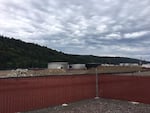Portland leaders will soon have to decide whether to grant Zenith Energy, an oil storage and transport company based in Texas, the permits it needs to continue operating within city limits.
The company’s facility in Northwest Portland has 84 above-ground tanks that can hold a little over 1.5 million barrels of oil. Zenith takes that stored oil and pumps it into oil tankers, and then ships take that crude oil and tar sands oil to other places in the United States and abroad for refining.
Over the last three years, the company has increased its oil-by-rail transport nearly 17-fold. If the city denies this permit — and if that denial were to withstand legal challenge — the decision could mean the end of Zenith’s operations in Portland.
Willamette University law professor Susan Smith specializes in environmental and natural resources law and told OPB’s Think Out Loud this week that the Zenith operation is a huge creator of fossil fuel emission, and those have been growing.
“They’ve made a 17-fold increase in the amount of what we call throughput: the amount of oil traveling through the plant,” Smith said. “That actually increases the amount of emissions from the plant.
Zenith took over the facility in Northwest Portland in 2017. Smith says it was originally an asphalt plant built in 1947.

A photo taken at the Zenith Energy oil terminal in Northwest Portland in May 2020.
Courtesy of Columbia Riverkeeper / OPB
“As you can imagine [it was] not built to today’s environmental standards at all,” she said.
Zenith needs two permits to continue its Portland operations: First, a land-use permit from the city’s Bureau of Development Services and, if that is approved, an air quality permit from the Oregon Department of Environmental Quality.
However, Smith said she believes that even if city regulators grant a land-use permit, the state could find reasons not to grant the air quality permit, particularly since the facility sits on the Willamette River. Studies have shown the likely effects of a Cascadia Subduction Zone earthquake on the six-mile stretch of oil storage tanks along the river would be catastrophic.
“DEQ can turn down an air quality permit where a use constitutes nuisance, and I think under Oregon law, you could call this use a nuisance unless there is some retrofitting of all these oil tanks,” Smith said.
Six years ago, the Portland City Council adopted a policy to “actively oppose expansion of infrastructure whose primary purpose is transporting or storing fossil fuels in or through Portland or adjacent waterways.” It also voted to oppose oil-by-rail transportation through and within the city. Yet Zenith continues to grow, Smith said.
“They haven’t expanded anything from their perspective,” Smith said “They’ve got the same old storage tanks that they always had.”
But, she said, Zenith has added rail platforms and increased production.
“There is a substantial increase in the amount of air pollutants that are being emitted from the facility,” Smith said. “So at least from my perspective, I would call that an expansion of infrastructure ... I think Zenith is improperly focusing on the fact that they haven’t expanded their storage tanks. Storage tanks are not the only thing that gives off air commission emissions”
Opponents of Zenith fear that that the city is going to grant the land-use permit to avoid a potential lawsuit by Zenith, but Smith believes Zenith has indeed violated the city’s policies. State regulators have asked the city to make a decision on the land-use permit by the end of August.